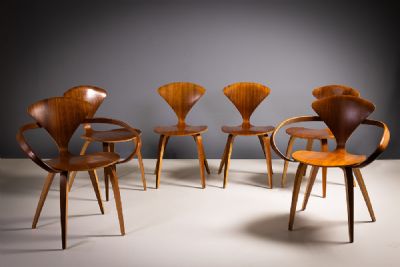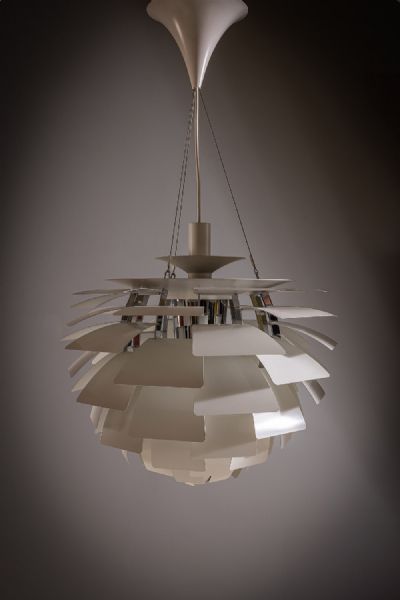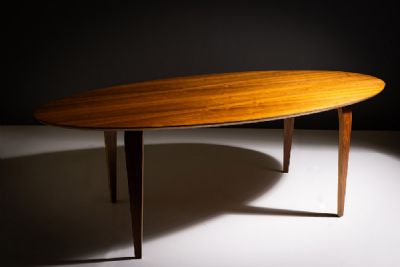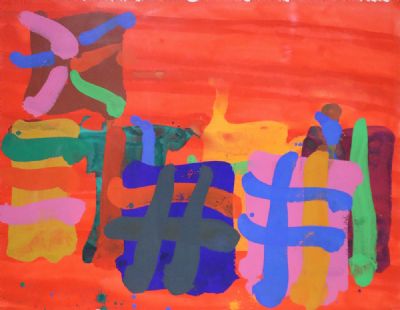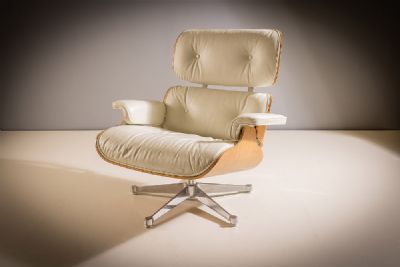Bidding on this item has ended.
Norman Cherner
10
Lot 10
Price Realised:
€5,500
Estimate:
€2,000 - €3,000
A SET OF 6 WALNUT CHAIRS by Norman Cherner, manufactured by The Cherner Chair Company, bearing labels
Pair of carvers: 70 (w) x 79 (h) 44 (seat height) cm.
Chairs x 4: 43 (w) x 79 (h) x 44 (seat height) cm.
New York City architect and designerNor...
Read more
 Lot 10
Norman Cherner
10
Lot 10
Norman Cherner
10
 Lot 10
Norman Cherner
10
Lot 10
Norman Cherner
10
Estimate:
€2,000 - €3,000
A SET OF 6 WALNUT CHAIRS by Norman Cherner, manufactured by The Cherner Chair Company, bearing labels
Pair of carvers: 70 (w) x 79 (h) 44 (seat height) cm.
Chairs x 4: 43 (w) x 79 (h) x 44 (seat height) cm.
New York City architect and designerNorman Cherner(192087) was fascinated by the principles of theBauhaus movementand taught atColumbia Universityand at New YorksMuseum of Modern Art. Designed in 1958, The Cherner Chair, boasting clean lines, gentle curves and organic material, distinctly embraces the attributes ofmid-century modern furniture. However, the story begins with the Pretzel Chair.
In the early 1950s, a plywood chair called The Pretzel debuted in aHerman Millershowroom.While beautiful, the Pretzel had structural problems and was expensive to make, so Herman Miller contracted Massachusetts manufacturerPlycraftto produce the chair. A dispute between the two companies and concerns over costs halted Pretzel production in 1957. However, with the materials and techniques for constructing plywood furniture, and not wanting them to go to waste, Plycraft president Paul Goldman commissioned Norman Cherner (a Nelson recommendation) to improve upon its design. A Pretzel-type chair that could be more easily produced on Plycrafts equipment.
The Cherner Chair, in the sculptural swoop of its wing-like arms and sloping seat made of layers of laminated plywood, emphasised the distinctive properties of working with the material. However, Goldman told Cherner the chair was cancelled, while continuing to sell it under a different name, Bernardo, later admitting this was a fictional name.
Cherner sued Plycraft after hed discovered hed been lied to. When a judge ruled in his favour in 1961 which forced Plycraft to pay Cherner royalties and bring the chair to market with proper credit it was good timing. The chair appeared inNorman Rockwells paintingThe Artist at Work,which ran on the cover ofTheSaturday Evening Postin September of that year. Cherners elegant chair was famous, and it remained in production until 1972.
Today, the Cherner Chair Company, founded by Norman Cherners sons Benjamin and Thomas, produces the Cherner chair based on Normans original drawings. The chairs in this sale are labelled and come with letters of authenticity.
Pair of carvers: 70 (w) x 79 (h) 44 (seat height) cm.
Chairs x 4: 43 (w) x 79 (h) x 44 (seat height) cm.
New York City architect and designerNorman Cherner(192087) was fascinated by the principles of theBauhaus movementand taught atColumbia Universityand at New YorksMuseum of Modern Art. Designed in 1958, The Cherner Chair, boasting clean lines, gentle curves and organic material, distinctly embraces the attributes ofmid-century modern furniture. However, the story begins with the Pretzel Chair.
In the early 1950s, a plywood chair called The Pretzel debuted in aHerman Millershowroom.While beautiful, the Pretzel had structural problems and was expensive to make, so Herman Miller contracted Massachusetts manufacturerPlycraftto produce the chair. A dispute between the two companies and concerns over costs halted Pretzel production in 1957. However, with the materials and techniques for constructing plywood furniture, and not wanting them to go to waste, Plycraft president Paul Goldman commissioned Norman Cherner (a Nelson recommendation) to improve upon its design. A Pretzel-type chair that could be more easily produced on Plycrafts equipment.
The Cherner Chair, in the sculptural swoop of its wing-like arms and sloping seat made of layers of laminated plywood, emphasised the distinctive properties of working with the material. However, Goldman told Cherner the chair was cancelled, while continuing to sell it under a different name, Bernardo, later admitting this was a fictional name.
Cherner sued Plycraft after hed discovered hed been lied to. When a judge ruled in his favour in 1961 which forced Plycraft to pay Cherner royalties and bring the chair to market with proper credit it was good timing. The chair appeared inNorman Rockwells paintingThe Artist at Work,which ran on the cover ofTheSaturday Evening Postin September of that year. Cherners elegant chair was famous, and it remained in production until 1972.
Today, the Cherner Chair Company, founded by Norman Cherners sons Benjamin and Thomas, produces the Cherner chair based on Normans original drawings. The chairs in this sale are labelled and come with letters of authenticity.
- Enquire
- View all lots by this artist
- How bidding works
Please note: You will require a deVeres account in order to bid. Please register via the website. Each lot will close numerically. If there is late bidding the time may be extended which could delay subsequent lots. The lots will start to close from 2.00pm on auction day, closing at 45 second intervals.
PLEASE BID EARLY TO AVOID DISAPPOINTMENT.
In order to allow rival bidders the opportunity to respond to a late bid the following extensions will apply:
IF A BID IS RECEIVED WITHIN THE FINAL 45 SECONDS OF THE COUNTDOWN THE CLOCK WILL RESET TO 60 SECONDS.
At any point you can leave a maximum bid, representing the highest price you are prepared to pay for a particular lot. Bidding only advances when there is competition from a rival bidder. In that case the system bids on your behalf, only up to the maximum if required. All bids are relayed to you be email, along with notification if you have been outbid.
All maximum bids are confidential and not disclosed. The system will endeavor to purchase the lot for you for the least price. Bids are subject to buyer’s premium of 25% (incl vat), with no additional charges.
In the event of a tied bid, the preference will be given to the bid submitted first. The second bidder will receive immediate notification of being outbid.
PLEASE BID EARLY TO AVOID DISAPPOINTMENT.
In order to allow rival bidders the opportunity to respond to a late bid the following extensions will apply:
IF A BID IS RECEIVED WITHIN THE FINAL 45 SECONDS OF THE COUNTDOWN THE CLOCK WILL RESET TO 60 SECONDS.
At any point you can leave a maximum bid, representing the highest price you are prepared to pay for a particular lot. Bidding only advances when there is competition from a rival bidder. In that case the system bids on your behalf, only up to the maximum if required. All bids are relayed to you be email, along with notification if you have been outbid.
All maximum bids are confidential and not disclosed. The system will endeavor to purchase the lot for you for the least price. Bids are subject to buyer’s premium of 25% (incl vat), with no additional charges.
In the event of a tied bid, the preference will be given to the bid submitted first. The second bidder will receive immediate notification of being outbid.
Sign-up to our auction alert
Signup for personalised Irish art recommendations, invitations to viewings and auctions, articles and more.

